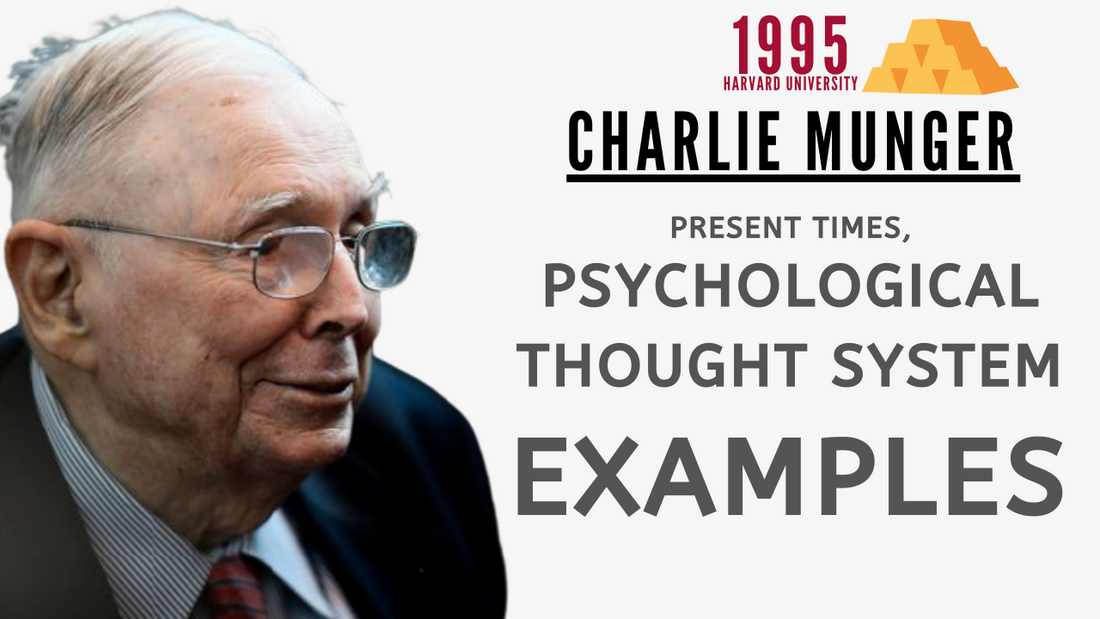
Charlie Munger on Psychological Thought System Examples. | Harvard University 1995【C:C.M Ep.92】
[Transcript]
CHARLIE MUNGER: The second question. Isn’t this list of standard psychological tendencies improperly tautological compared with the system of Euclid? That is, aren’t there overlaps, and can’t some items on the list be derived from combinations of other items? The answer to that is, plainly, yes.
Three. What good, in the practical world, is the thought system indicated by the list? Isn’t practical benefit prevented because these psychological tendencies are programmed into the human mind by broad evolution so we can’t get rid of them? Broad evolution, I mean the combination of genetic and cultural evolution, but mostly genetic. Well, the answer is the tendencies are partly good and, indeed, probably much more good than bad, otherwise they wouldn’t be there. By and large these rules of thumb, they work pretty well for man given his limited mental capacity, and that’s why they were programmed in by broad evolution.
At any rate, they can’t be simply washed out automatically and they shouldn’t be. Nonetheless, the psychological thought system described is very useful in spreading wisdom and good conduct when one understands it and uses it constructively.
Here are some examples.
Karl Braun’s communication practices. He designed oil refineries with spectacular skill and integrity. He had a very simple rule. Remember I said, “Why is important?” You got fired in the Braun company. You had to have five Ws. You had to tell who, what you wanted to do, where and when, and you had to tell him why. If you wrote a communication and left out the why, you got fired, because Braun knew it’s complicated building an oil refinery. It can blow up. All kinds of things happen, and he knew that his communication system worked better if you always told him why. That’s a simple discipline, and boy does it work.
Two, the use of simulators in pilot training. Here, again, abilities attenuate with disuse. Well, the simulator is God’s gift because you can keep them fresh. The system of Alcoholics Anonymous, that’s certainly a constructive use of somebody understanding psychological tendencies. I think they just blundered into it, as a matter of fact, so you can regard it as kind of an evolutionary outcome. But, just because they blundered into it doesn’t mean you can’t invent its equivalent when you need it for a good purpose.
Clinical training in medical schools. Here’s a profoundly correct way of understanding psychology. The standard practice is to watch one, do one, teach one. Boy does that pound in what you want pounded in. Again, the consistency and commitment tendency. That is a profoundly correct way to teach clinical medicine.
The rules of the U.S. Constitutional Convention, totally secret, no vote until the final vote, then just one vote on the whole Constitution. Very clever psychological rules, and if they had a different procedure, everybody would have been pushed into a corner by his own pronouncements and his own oratory and his own … and no recorded votes until the last one. And they got it through by a whisker with those wise rules. We wouldn’t have had the Constitution if our forefathers hadn’t been so psychologically acute, and look at the crowd we got now.
Six, the use of granny’s rule. I love this. One of the psychologists who works with the center gets paid a fortune running around America, and he teaches executives to manipulate themselves. Now granny’s rule is you don’t get the ice cream unless you eat your carrots. Well, granny was a very wise woman. That is a very good system. So this guy, a very eminent psychologist, he runs around the country telling executives to organize their day so they force themselves to do what’s unpleasant and important by doing that first, and then rewarding themselves with something they really like doing. He is profoundly correct.
Seven, the Harvard Business School’s emphasis on decision trees. When I was young and foolish, I used to laugh at the Harvard Business School. I said, “They’re teaching 28-year-old people that high school algebra works in real life?” We’re talking about elementary probability. But later, I wised up and I realized that it was very important that they do that, and better late than never.
Eight, the use of post-mortems at Johnson & Johnson. At most corporations, if you make an acquisition and it works out to be a disaster, all the paperwork and presentations that caused the dumb acquisition to be made are quickly forgotten. You’ve got denial, you’ve got everything in the world. You’ve got Pavlovian association tendency. Nobody even wants to even be associated with the damned thing, or even mention it. At Johnson & Johnson, they make everybody revisit their old acquisitions and wade through the presentations. That is a very smart thing to do. By the way, I do the same thing routinely.
Nine, the great example of Charles Darwin is he avoided confirmation bias. Darwin probably changed my life because I’m a biography nut, and when I found out the way he always paid extra attention to the disconfirming evidence, and all these little psychological tricks, I also found out that he wasn’t very smart by the ordinary standards of human acuity, yet there he is buried in Westminster Abbey. That’s not where I’m going, I’ll tell you. And I said, “My God, here’s a guy that, by all objective evidence, is not nearly as smart as I am and he’s in Westminster Abbey? He must have tricks I should learn.” And I started wearing little hair shirts like Darwin to try and train myself out of these subconscious psychological tendencies that cause so many errors. It didn’t work perfectly, as you can tell from listening to this talk, but it would’ve been even worse if I hadn’t done what I did.
And you can know these psychological tendencies and avoid being the patsy of all the people that are trying to manipulate you to your disadvantage, like Sam Walton. Sam Walton won’t let a purchasing agent take a handkerchief from a salesman. He knows how powerful the subconscious reciprocation tendency is. That is a profoundly correct way for Sam Walton to behave.
Then, there’s the Warren Buffett rule for open-outcry auctions: don’t go. We don’t go to the closed-bid auctions too because they … that’s a counter-productive way to do things ordinarily for a different reason, which Zeckhauser would understand.
(Source: https://youtu.be/07f8oasWqWg)
[YAPSS Takeaway]
Examples are truly a great way to teach. Starting to know a little more about Charlie's earlier episodes on psychological tendencies.
